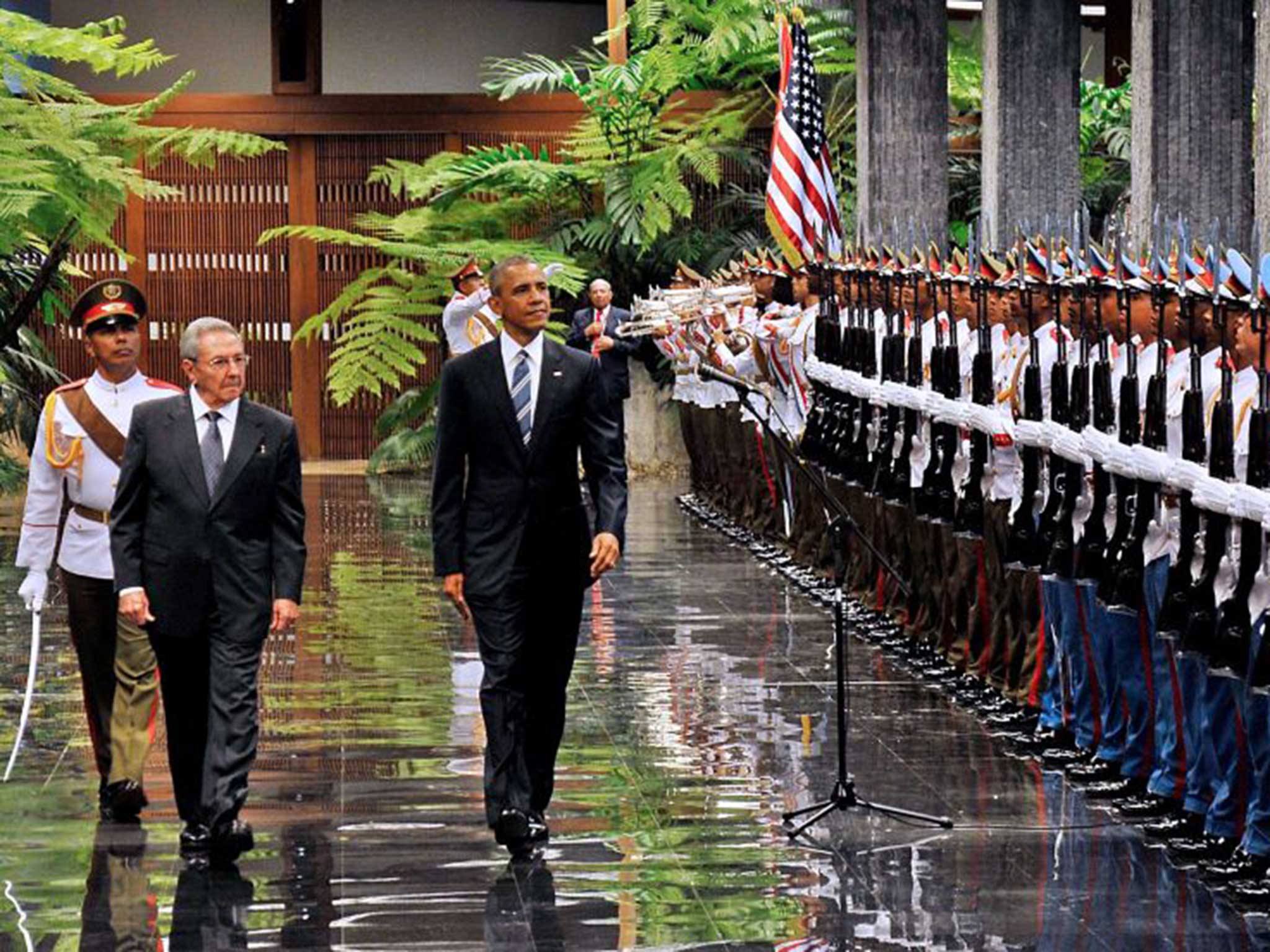We shouldn't celebrate Obama's visit to Cuba - a US influx spells bad news for Cuban culture and human rights
Interventions in Latin America have at times been subtle, and at times catastrophic and genocidal, if not usually profitable for the US

Your support helps us to tell the story
From reproductive rights to climate change to Big Tech, The Independent is on the ground when the story is developing. Whether it's investigating the financials of Elon Musk's pro-Trump PAC or producing our latest documentary, 'The A Word', which shines a light on the American women fighting for reproductive rights, we know how important it is to parse out the facts from the messaging.
At such a critical moment in US history, we need reporters on the ground. Your donation allows us to keep sending journalists to speak to both sides of the story.
The Independent is trusted by Americans across the entire political spectrum. And unlike many other quality news outlets, we choose not to lock Americans out of our reporting and analysis with paywalls. We believe quality journalism should be available to everyone, paid for by those who can afford it.
Your support makes all the difference.Obama’s visit to Cuba is no small event. The first sitting President in almost 90 years to set foot on the island following decades of what might, in polite circles, be dubbed frosty relations - involving no less than 638 attempts on Fidel Castro’s life by the CIA, a botched military invasion of Cuba under Kennedy, and the most prolific trade embargo in modern history – is more than a little noteworthy.
What the visit will mean in the long term is less clear. Hailed as a new dawn for the island, it is perceived by some to mark the beginning of economic liberation and the potential for an improved human rights record. I am unconvinced on either front.
Human rights have been flagged by Obama as key to the “full flourishing” of the relationship between the nations. Undoubtedly, Cuba has a lot to answer for, even by the standards of those who support the Castros. But although he passionately defends fundamental rights such as health care, Obama heads an administration which has presided over and justified the use of torture, has openly celebrated extra-judicial execution, and has failed to ratify the American Convention of Human Rights - exempting its citizens from the protection of the Inter-American Court of Human Rights.
It must also be remembered that close relationships between the US and Latin American nations rarely result in improved human rights for the latter - often the opposite.
Interventions in Latin America have at times been subtle, and at times catastrophic and genocidal, if not usually profitable for the US. Examples abound: the systematic slaughter of the Mayan population in Guatemala following a US sponsored coup against the democratically elected President (the coup was of immense benefit to the politically well-connected United Fruit Company) to name but one.
Those in glass houses can and do throw stones, but perhaps they aren’t best placed to advise on human rights.
Next up, then, are the claims of economic liberation. The US-Cuba embargo has been easing under Obama, with US hotel giant Starwood signing a deal to run three Cuban hotels just days before his visit, hot on the heels of an agreement to resume commercial flights a few weeks ago. This agreement could see 110 flights a day between the US and Cuba, increasing tourism from the North by a potential 400 per cent.
Cuba is no stranger to tourism. With the majority of Latin America seeing stable democracy replace decades of turmoil, dictatorship and civil war, the region has experienced a tourism boom in recent years. But tourism is a double-edged sword, particularly in the developing world.
If managed well, it can inject funds into an economy and create jobs. Unmitigated, it can disrupt and displace communities, drain natural resources, and lead to economic “leakage”, where tourist money leaves with foreign tour operators rather than benefiting the local economy.
US tourism is an important source of revenue in Latin American countries, particularly in Central America and the Caribbean. The dollar speaks volumes.
Among other stints living and travelling in Latin America, I spent a year living in Costa Rica, a short hop from the States, where the excesses of English-speaking tourism are writ large. At best, they manifest themselves in yogic enclaves that outprice local residents with expensive juice bars and the ironic use of Spanish, and at worst, through the spread of sex tourism and drug use.
We shouldn't assume the upper hand; we share more than just a language with our neighbours across the pond. Their approach to travel in foreign nations has, just like ours, elements of the responsible and the respectful, and plenty of the ignorant, insulting, and destructive.
Although Cuba’s tourism industry - and sadly, as a quick Google search reveals, its sex tourism industry - is well established, a rapid influx of US tourism could make significant inroads into Cuban community and culture. Not all of them would be positive.
Join our commenting forum
Join thought-provoking conversations, follow other Independent readers and see their replies
Comments